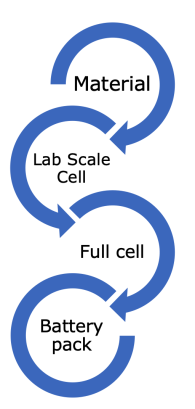
Research activities
The Battery Innovation Centre is active in the research and development of various rechargeable energy storage systems. The research area covers different aspects of batteries at different scales starting from small coin cells up to large battery packs. Through in-depth characterization supported by multiscale mathematical modelling, the Battery Innovation Centre has been contributing significantly to the development process of rechargeable energy storage systems.
Development of next-generation battery technologies
Next-generation battery technologies such as solid-state battery a d Li-Sulfur battery lacks a complete understanding of the underlying physics. Through in-depth characterization and mechanical modelling, we aim to elucidate the fundamental understanding of it.
Battery cell fabrication and process optimization
Battery cell fabrication know-how is key to performance development. In particular, the fabrication of all-solid-state batteries poses a significant challenge. Thanks to a battery fabrication research line in our dry room, we are working towards a scalable and optimized fabrication process for all-solid-state batteries.
Mathematical modelling
The mathematical modelling of battery sytems can help facilitate the understanding of the underlying operation mechanism, cell design and system integration. Our Battery Innovation Centre is well known for its modelling expertise. The main modelling domains are:
- Continuum electrochemical modelling
- Electrical modelling
- Thermal modelling
- Lifetime prediction modelling
- Fabrication process modelling

State estimation
Through state-of-the-art equivalent circuit modelling, data-based intelligent algorithms and differential capacity analysis, we have been accurately estimating the state-of-charge, state-of-health, state-of-power,... of batteries.
Non-linear system identification techniques
Wa can better understand battery behaviour, through our in-house developed system identification techniques.

Ageing prediction and degradation mechanism detection
Through in-depth anti-mortem and post-mortem characterization, the degradation mechanisms can be identified. This characterization data is then fed to our models to accurately predict ageing behaviour.
Control strategies for battery management systems
At our Battery Innovation Centre, we develop efficient algorithms for battery management systems. Development and prototyping thermal management systems a large group of several researchers are involved in devloping efficient thermal management strategies for battery packs. The work involves complex CFD simulationcoupled with electrical modelling of battery cells. The simulation model is validated in self-built protypes.

Battery sizing strategy
By the means of in-house developed models, we develop strategies of battery sizing for automotive and stationary energy storage applications.
Evaluation of second-life batteries
The Battery Innovation Centre has been actively studying the second-life behaviour such as capacity fade and resistance increase of vehicle-retired batteries.

Standardisations
Experts of the Battery Innovation Centre are regularly involved in standardisation of testing procedures for energy storage systems.
